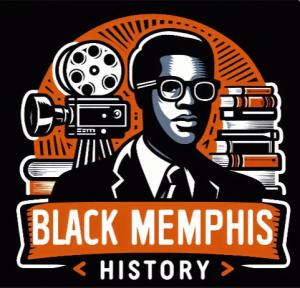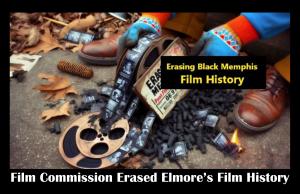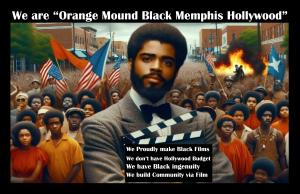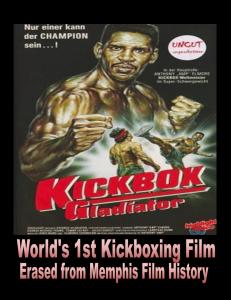Memphis World Kickbox Champ & filmmaker Elmore Ask Memphis Mayor Paul Young to Give Black History & Culture a Chance

Creating a Black Film Culture in Memphis celebrates diversity, enriches the arts, and honors heritage. It fosters unity, showcases talent, and inspires future generations, while also boosting local economy creating tourism opportunity Black pride culture & self respect

Anthony "Amp" Elmore Pioneers Black Memphis history through cinema, Elmore ask Memphis Mayor Paul Young to acknowledge the importance of "Black Memphis History" & encourage young Black Memphians to learn their Black history anyone with access to the web can learn free

Memphis Film Commission embrace a practice & Culture that erases Elmore's Black Memphis Film History Elmore asks Mayor Young to rightfully acknowledge Memphis Black community of Orange Mound "Legitimate Birthplace of Memphis Independent 35mm theatrical Filmmaking"
Memphis 1st Independent Filmmaker & World Kickbox Champ Anthony Amp Elmore ask Black Memphis Mayor Paul Young to give Black History & Culture an Opportunity
The letter is a call to action for the city to acknowledge and embrace its African American heritage. Elmore points out that while Memphis is the most densely populated city of African Americans in the United States, it lacks a comprehensive chronological history of its Black community. To address this, Elmore has taken the initiative to create www.BlackMemphisHistory.com,
The Black Memphis History Website serves as a digital cinematic library chronicling 200 years of Black Memphis history. The website explores the rich history of Black Memphis over the past two centuries. Visitors can discover key figures, events, and landmarks that have shaped the city’s legacy. It provides a comprehensive resource for learning about African American contributions, struggles, and cultural heritage in Memphis. The website preserves and celebrates the cultural heritage of African Americans in Memphis. It ensures that their stories are documented and accessible for future generations.
By recognizing their heritage, African Americans gain a sense of pride and empowerment. It inspires activism, resilience, and positive change. Elmore’s work bridges the gap between Africa and Black Americans. It promotes cultural diplomacy, understanding, and collaboration across continents.
The site chronicles Black Memphis history starting with a video titled “An Afro-Indigenous History,” which presents the groundbreaking narrative supported by DNA evidence that African people were present in the Americas before Columbus’ arrival. The Black Memphis History Website contributes to Memphis by preserving heritage, educating, empowering, and fostering connections within the community and beyond.
While Memphis, Tennessee is nearly a 70% African/American population whereas there is a majority Black City Council and a majority Black Shelby County commissioner and a Black Memphis City Mayor and a Black Shelby County Mayor Black History and Black Culture is giving limited opportunity in Memphis.
The latest disparity study conducted by Griffin & Strong, P.C. in Shelby County, which includes Memphis, Tennessee, has highlighted significant inequalities and limited opportunities for Black-owned businesses in the region. The study, which reviewed contracting practices from 2016 to 2020, found that Black American-owned businesses, along with Asian American-owned, Native American-owned, and non-minority women-owned firms, were underutilized in prime contracts. Please click link to view details: https://www.scsk12.org/mwbe/?PN=108
Anthony "Amp" Elmore challenges anyone to do an online search of the 2010 "Griffin/Strong Disparity Study." The study revealed a gross misrepresentation inequality in regards to the City of Memphis during business with Black Businesses even under a Black Mayor.
The report revealed that out of 2,800 businesses registered to do business with the City of Memphis only 6 were Black and they were caterers.
The study revealed that in the city of Memphis over a billion dollars has been invested downtown, whereas African/American did not get 1% of the business in downtown Memphis. Elmore asks Memphis Mayor Paul Young to give "Black History & Culture an Opportunity."
Just as there is limited opportunity for African/Americans to do business with the city of Memphis there is limited opportunity for African/Americans to learn Black Culture and history in Memphis. Learning Black history allows African Americans in Memphis to connect with their cultural roots. It provides a sense of identity and belonging. Understanding the struggles, achievements, and contributions of past generations fosters pride and resilience.
Black history encompasses stories of resilience, creativity, and activism. By learning about these narratives, individuals gain a deeper appreciation for their heritage. It’s essential to recognize the impact of African American leaders, artists, and community members who shaped Memphis. Knowledge of Black history empowers individuals to advocate for justice and equality.
When people understand the historical context, they can actively work toward positive change in their communities. Learning from the past inspires future generations. African American youth can draw strength from the stories of those who fought for civil rights and social progress. Black history serves as a roadmap for building a more inclusive and equitable Memphis.
Elmore has created and working on a comprehensive chronicle of Black Memphis history through cinema, producing hundreds of long and short films that serve as educational tools accessible via the internet. His work transcends the limitations of traditional books, utilizing the powerful medium of film to document and teach Black Memphis history. Elmore’s request to Mayor Young extends to seeking assistance in informing media outlets and educational institutions about this public service, emphasizing the importance of recognizing and valuing the cultural heritage and historical contributions of African Americans in Memphis.
Elmore articulates that although he does not possess the formal credentials of a scholar or historian, nor a college degree, his dedication to historical precision stands on par with the most esteemed intellectuals, scholars, and historians. His knowledge may not rival theirs, but what sets him apart is his indomitable spirit and bravery in narrating the history of Black Memphis. Unlike traditional scholars who document history in writing, Elmore brings history to life through filmmaking, employing various art forms and drawing from his own experiences of living Black Memphis history.
Elmore approached Memphis Mayor Paul Young with a pressing concern regarding the practices of the Memphis Shelby County Film Commission, which he describes as “Historical Negationism & Historical Revisionism.” Elmore argues that such practices are not only discriminatory and demoralizing but also detrimental to the integrity of Memphis’s history, particularly as they have led to the exclusion of his 1987 Memphis 1st Independent 35mm Theatrical Film production "The Contemporary Gladiator,"
Elmore highlights a specific instance from 2007 when the Memphis Shelby County Film Commission and the Shelby County Historical Commission erected a historical marker at the corner of G.E. Patterson and Main Street. He criticizes this act as crossing the line into abuse of power, nepotism, and self-adulation. Linn Sitler, a public employee of Memphis in Shelby County, is called out for using taxpayer dollars to promote a revisionist history that serves her interests, positioning herself as a “King Maker.”
Furthermore, the text on the 2007 Modern Memphis movie marker credits the film “Mystery Train” for revitalizing the Memphis movie-making industry since 1988. It also acknowledges the significant contributions of Linn Sitler and Alonzo Woods, both paid Shelby County employees. Elmore takes issue with this, noting that Woods, who has never made a film, is being recognized simply for performing his job duties, which Elmore does not consider heroic.
He contends that Sitler has misused taxpayer funds to elevate her status and influence within the industry. Elmore’s critique calls for a reevaluation of how Memphis’s film history is commemorated and who is recognized for contributing to its development.
Click Here to read a January 24, 2004 News Release titled:1 L A Times TV Guide TCM IMDB List Black Film "The Contemporary Gladiator" all but Erased From Memphis Film History: Why.
Giving Black history and culture an opportunity means creating spaces and platforms where these narratives can be shared, celebrated, and integrated into the broader historical context of Memphis, thereby enriching the cultural fabric of the city with the stories and contributions of its African American citizens.
Elmore asks Memphis Mayor Paul Young to give the African American Community of Orange Mound a platform. In the heart of Orange Mound, the historic Black community in Memphis, Elmore seeks to get his groundbreaking film project is underway via turning the community of Orange Mound into a movie film set and involving the community to be a part of the film's development. Elmore who is Memphis ist Independent 35mm Theatrical Filmmaker purposefully wrote the movie script titled “Rock and Roll: A Black Legacy.” The aim of the film is to uplift, inspire, and educate not only the local community but also audiences worldwide. Drawing from actual history, culture, and the voices of Orange Mound residents, the film weaves a tapestry of stories. From the youngest to the oldest, everyone has a role – capturing the essence of this vibrant neighborhood.
Elmore, a five-time World Karate/Kickboxing Champion, is embarking on a cinematic journey that defies the conventional path. With a deep-seated desire to educate and inspire, he aims to highlight the Swahili Kwanzaa term “Kuumba,” which signifies creativity. As a seasoned fighter, Elmore knows that the spirit of a champion cannot be purchased; it is an innate quality that resides within the heart. He acknowledges the reality that even multi-million dollar film productions can fail at the box office, but he finds profound joy in the filmmaking process. Utilizing his “Black Magic” camera, Elmore crafts a script that encapsulates the collective minds, hearts, and emotions of the community.
Elmore’s vision extends beyond the allure of a Hollywood budget or the desire to produce a mainstream film. His goal is to enrich his community by fostering opportunities, celebrating Black history, and uniting people through the power of storytelling and song. The film’s early scenes are being shot in Kisumu, Kenya, reflecting Elmore’s aspiration to bridge the gap between Africans and African Americans. He seeks to offer a contemporary perspective of Africa to Americans, while also showcasing the vibrant community of Black Orange Mound.
The film is set to be a cultural exchange, with premieres planned in both Kenya and Memphis. Elmore has extended an invitation to Memphis Mayor Paul Young to visit the film set, emphasizing the importance of the Mayor’s support. He urges Mayor Young to direct the Memphis Shelby County Film Commission to provide the same level of assistance they offer to established Hollywood productions, from securing locations to organizing casting calls. Elmore’s request is a call for equity, asserting that as taxpayers, the community deserves equal treatment in the film industry.
The film’s uniqueness lies in its commitment to inclusivity. Elderly residents, even those no longer with us, become part of the narrative, ensuring their stories endure. As the movie transcends borders, it ventures to Kenya, bridging cultures and inspiring African youth. The former Safari House Museum, now a cultural center, stands as a testament to Orange Mound’s African heritage – a priceless treasure that would cost millions to replicate elsewhere.
Elmore encourage readers: Click Here: Orange Mound Black Filmmaking Building Community Via Filmmaking2. This video tells the story how Black History and Culture via Filmmaking can empower Memphis and the African/American Community of Orange Mound via Filmmaking.
“The Contemporary Gladiator” also has historical significance in Kenya. It became Kenya’s first African and African American trade, cultural, and family agreement when it premiered in Nairobi in 1990. Interestingly, this occurred before Barack Obama Jr., who later became America’s first African American president, visited Kenya in 1988.
Elmore’s visit to Kenya was a momentous occasion. As the first American independent filmmaker to premiere a movie in Kenya or Africa, Elmore played a crucial role in cultural diplomacy. The film’s premiere marked a specific date and historical relevance, representing a formal agreement.
Over the next decade, Elmore continued to foster connections between African Americans and Kenya. In 1992, he met Kenya’s late President Daniel Arap Moi, who honored Elmore with the title of African Ambassador. Elmore further introduced kickboxing to Kenya through a documentary video titled “Kickboxing in Kenya” in March 1994. Later that year, he produced the documentary film “African Americans on a Kenya Safari.”
In December 1994, Elmore organized a soul music concert in Kenya and established agreements with various Kenyan businesses. Notably, in 2008, when President Obama was elected as the U.S. President, Elmore collaborated with designers and tailors in Ghana to create an inaugural African-styled tuxedo. Memphis Congressman Steve Cohen then delivered this unique tuxedo to the White House.
The White House accepted the African-styled Mudcloth tuxedo, although President Obama did not personally wear it. Anthony “Amp” Elmore, hailing from the historic community of Orange Mound in Memphis, designed this unique tuxedo via Ghana. In a gracious gesture, President Obama sent Elmore a thank-you note and informed Memphis Congressman Cohen that the garment would find its place in the Barack Obama Presidential Library.
Title: “Memphis World Kickbox Champ & Filmmaker Elmore Asks Memphis Mayor Paul Young to Give Black History & Culture a Chance”
From August 25th to September 1, 2024, the world’s largest Black and African Art, Culture, and Trade Festival is happening in Kisumu, Kenya. Anthony “Amp” Elmore, a 5-time World Kickboxing Champion and Memphis’ first 35mm Independent Theatrical Filmmaker, has been invited to attend and speak at the event. Kisumu’s Governor, Peter Anyang Nyong’o, extended the invitation. While many may not recognize Governor Nyong’o’s many know his daughter, Academy Award winner Lupita Nyong’o, our visit serves as an extension of the relationship between Kenya and Memphis.
Elmore aims to establish not only a sister city relationship between Kisumu, Kenya, and Memphis but also to facilitate arrangements for filming scenes in both locations. Additionally, Elmore is organizing “Tom Mboya’s 70th and the 1st Black Family Reunion in Africa.” He invites Memphis Mayor Paul Young and Memphians to join him in 2026 for “The Barack Obama Heritage Tour” and a celebration in Kisumu. Furthermore, Elmore envisions making “Memphis Africa’s Distribution Center” and plans to arrange a trade deal between Kenya and Memphis.
In conclusion, Elmore emphasizes the power of visual media. His 1987 film production, “The Contemporary Gladiator,” was purchased by Germany, retitled “Kickbox Gladiator,” and translated into German. Despite facing discrimination and obscurity, this 1988 Black Film holds the distinction of being the world’s first Kickboxing film in cinematic history. There is a saying "A Picture is worth 1000 Words. Click here You can watch the entire film in the German language.3 This is worth "One Million Words." Elmore can explains so many good things can happen via giving "Black history & Culture an Opportunity."
Anthony Elmore
Black Memphis Hollywood
+1 901-452-4330
anthony@elmorecarpets.com
WATCH NOW: Most African Home in America Video Tour at https://www.youtube.com/watch?v=UplRtCFG4QY&t=208s

1 https://www.einnews.com/pr_news/680003134/l-a-times-tv-guide-tcm-imdb-list-black-film-the-contemporary-gladiator-all-but-erased-from-memphis-film-history-why
2 https://www.youtube.com/watch?v=4dw8iXXp73A
3 https://www.youtube.com/watch?v=cTUHiXFLvhk


